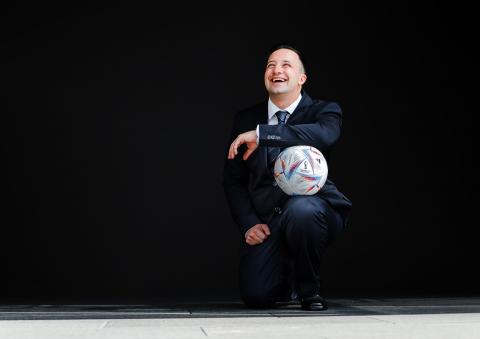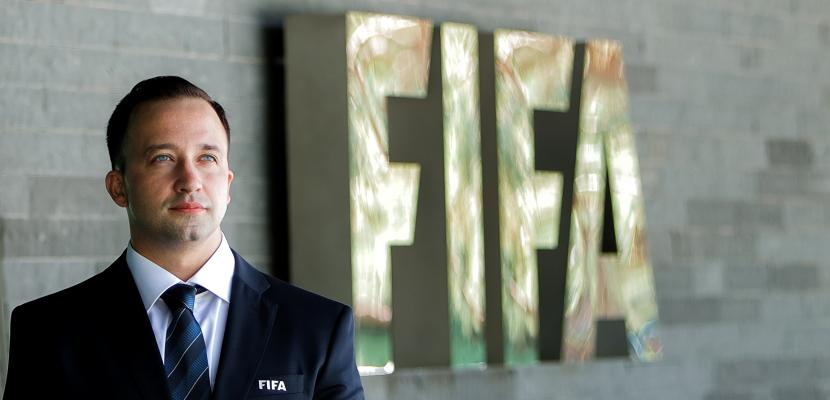
This article appeared in edition 31 of the Bond University alumni magazine the Arch.
When the Socceroos play reigning world champions France in their November 23 World Cup opener, 40,000 fans will file into Qatar’s Al Janoub Stadium, each mixing sweaty-palmed excitement with a nauseating undercurrent of dread that is the tax payable for those whose passion for sport sends them around the world to cheer on their teams. Robert Sheppard (Class of 2013) will share that uneasy hammering in his heart with his fellow sport buffs. Many will attempt to distract themselves by marvelling at the roof on the $A1 billion stadium, inspired by the sails of the traditional dhow boats used by local pearl divers, a unique architectural gem of the first-ever World Cup to be held in an Arab nation. Mr Sheppard is gratefully immune to the result-based anxiety that will engulf the crowd. He already knows he will be belting out his national anthem in celebration at the end of the match. With a French mother and an Aussie father, this game is a win-win for the sports-mad Bondy. The Gallic pride that bubbles to the surface each time he hears La Marseillaise is matched only by the patriotic fervour inspired by Advance Australia Fair. And unlike the estimated 1.5 million people who will converge on the Gulf nation, he is not in Qatar for the trip of a lifetime but will instead be taking a quick time-out from his busy schedule as Project Manager in FIFA’s People, Technology and Operations division. It is the success of the tournament that has him on edge.
While the Green and Gold Army, the traveling band of hardcore Socceroos fans, gaze in wonder at their sporting heroes, Mr Sheppard will tick off a mental checklist to ensure the return of the Australian side to their base at the Aspire Academy, a customised facility that has one indoor and six outdoor football pitches, an Olympic-sized swimming pool, an indoor athletics track, an outdoor gym and a table tennis area. He will do the same for France, who are lodging at the palatial Al Messila Resort about an hour from the ground. At the completion of the match, a tidal wave of fans will spill out of the stadium, some floating on the euphoria of watching their side take the first step towards a hopeful place in the tournament’s final 16, the others shadowed by a dark cloud of despair at missed opportunities on the pitch and already looking towards the next opponent with a pulse-quickening sense of trepidation. Almost subconsciously these fans will follow the person in front of them towards the transport systems that will distribute them to accommodation spread out across Al-Wakrah, Qatar’s second largest city which sits on the shores of the Persian Gulf or further afield to the capital Doha. Mr Sheppard will watch the flow of human traffic, bouncing along like tiny sailboats on a river, satisfied that each fan is on a predetermined course, years in the planning.
“People assume sporting events just happen but there is so much that goes on behind the scenes,’’ he says. “It is unrealistic to believe you can produce a perfect event, but the way for us to deliver the best World Cup is to make sure problems of previous competitions are fixed and that all our internal processes work well. And externally, it is simply that people feel safe and enjoy the experience of a lifetime.’’
The entire 64-game World Cup, contested by 32 countries including Qatar who receive automatic entry as host nation, is run out of a Main Operations Centre (MOC) in Doha, where Mr Sheppard will support the operation of the Guest Services Integration Area which looks after the needs of visiting teams and key guests, including transport and travel, accommodation, logistics and VIP operations. The army of event staff and volunteers it takes to run a major global sporting event will also be under his remit. No two days are the same at the World Cup, but a typical shift begins around 6am when Mr Sheppard will produce reports for management on the day’s activities and track the planned movements of key stakeholders to ensure the best possible experience for them. Then it’s into game time when he will rotate between the MOC or the VIP and VVIP areas at one of the tournament’s eight stadiums. The final siren sparks a frenzy of activity to ensure teams and guests are delivered safely home or to one of the FIFA activations around the country. Finally, he will return to base where the day’s procedures are summarised and any issues that may have occurred are addressed and rectified ahead of the following day. Sometime between midnight and 3am when big matches are played - and around 10pm on the few quiet days on the schedule - he’ll head back to FIFA base camp for some much-needed sleep before lacing up the boots and doing it all again.

“It is quite diverse, and it is mostly an overall coordination role of certain key aspects of the tournament,’’ he says. “They are very long and intense days but that’s the way we like it. It is one of the most exciting events to be involved with in world sport.’’
Mr Sheppard was born near Lausanne, in the French-speaking region of Switzerland, which means he also has skin in Group G where the Swiss will come up against football heavyweights Brazil. He stayed there until moving to Australia, via a stint in Samoa, when he was 16. He completed his schooling in Sydney and immediately adopted the AFL’s Swans and the A League’s Sydney FC as his two sporting sides. From there he headed to the Sunshine State to undertake a double degree in Law and Communications at Bond University. “It feels like yesterday but it has been more than five years,’’ he says. “Bond was a very special time for me. I loved every minute of my time there.”
He began his working life as a lawyer, with the breakthrough for a career in sports administration coming when he scored a role as a client liaison officer in the visa hub for the 2018 Commonwealth Games Organising Committee. That led to a Spectator Services Supervisor’s gig during the Gold Coast Games. “I have to say that the first event I was involved in as staff remains very special to me,” he says. “The Commonwealth Games, which is known as the ‘friendly games’, was incredible and opened the doors for me to this wide world of sporting events. I saw first-hand the raw emotion that an athlete experiences. And to be part of creating these emotions was the most rewarding feeling I had felt. I remember on the final night of the swimming when Australia won the final gold of the competition in the relay, the atmosphere was electric, and I could see that the crowd were forgetting all about their daily tribulations of problems just for a moment. It’s when I first realised the power sport has and it was then that I decided I would move away from the legal world and make this my career.’’
So he packed his bags, grabbed his passports and headed to Glasgow in Scotland as Member Federation Relations Manager at the European Championships, a seven-sport mini-Olympics contested by over 1500 athletes from 52 nations throughout Europe. His path was set. From there he tic-tacked from one major sporting event to another around the world in a variety of roles. He was a Patron Services Officer at the Australian Open tennis in 2019, Resident Services and Athlete Villages Operations Manager at the World Summer University Games in Naples, Italy and then Athlete Role Model Attaché for 2020’s Winter Youth Olympics in Lausanne, Switzerland. At Naples, where he was in charge of operations in the athletes’ village, he enjoyed a unique set of challenges not even the most seasoned sporting administrators are likely to have experienced. The athletes were housed on a pair of cruise ships in the Stazione Maritima in Porto Napoli village, the terminal within the city’s main harbour. A vivid imagination and some clever project management was required to ensure the athletes were provided with the type of conditions and facilities that would allow them to perform at their best.
“We created an open-air gym on the top deck and makeshift ice-baths from jacuzzis, to name a few examples,’’ he said. “I basically lived on a ship for three weeks and barely stepped foot on land, so much so that I couldn’t stand properly when it finally got to going back to land. But it was great fun.’’ All the time he was building the skills, experiences and contacts for entry to the big league. And in world sport, that can mean one of only two things: a soccer World Cup or an Olympics.
At the completion of this World Cup, Mr Sheppard will head home for a well-deserved rest before reprising his role with FIFA for the 2023 Women’s World Cup to be hosted in Australia and New Zealand in July next year. Mr Sheppard does not know to which exotic global destination his sporting journey will carry him beyond that, but he is sure of one thing: this is an around-the-world trip that will eventually return him to Queensland for the 2032 Olympics. “It would be a homecoming,’’ he says. ”The very first event I worked on was the Gold Coast Commonwealth Games and to come back to Australia to help deliver an Olympics would be the ultimate for me.’’